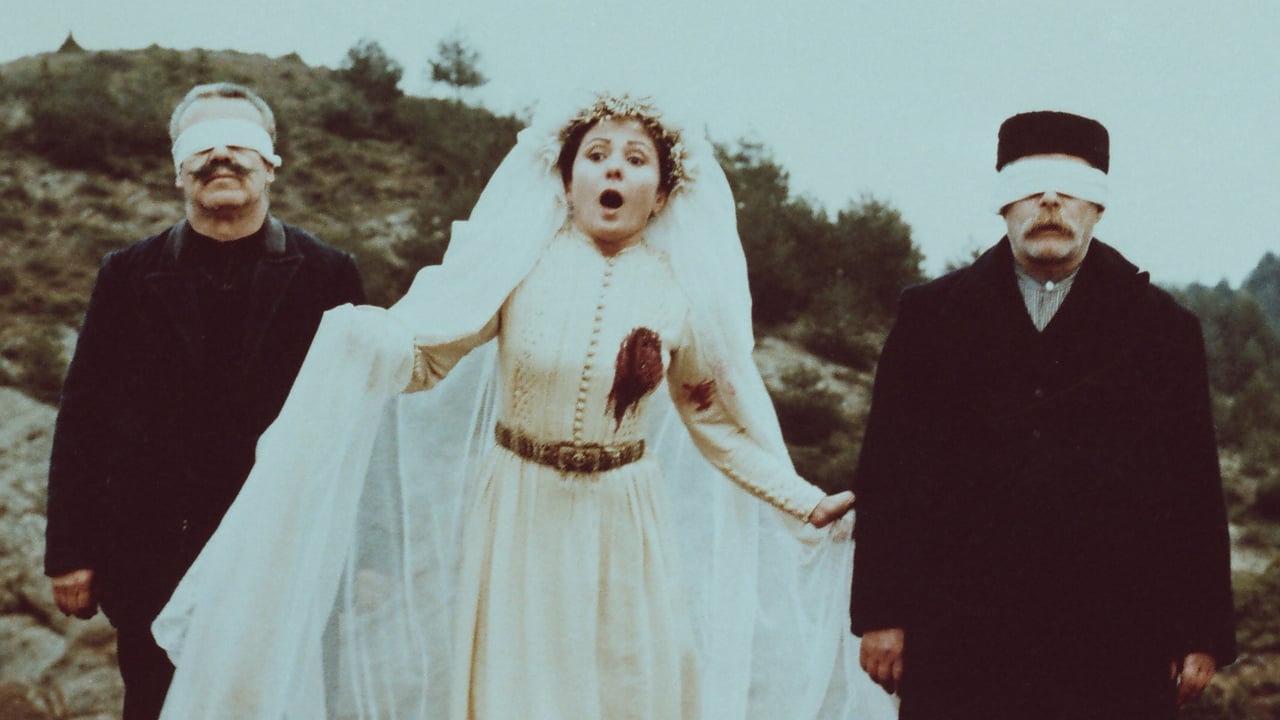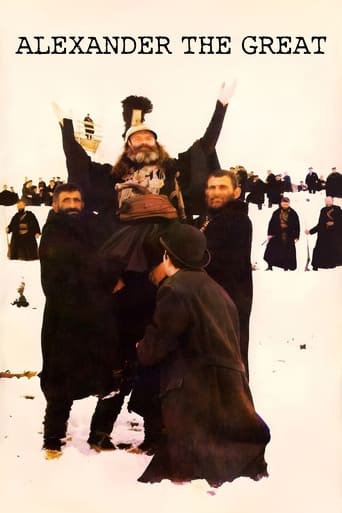Diagonaldi
Very well executed
NekoHomey
Purely Joyful Movie!
Fluentiama
Perfect cast and a good story
Peereddi
I was totally surprised at how great this film.You could feel your paranoia rise as the film went on and as you gradually learned the details of the real situation.
Martin Bradley
The more I see of Theo Angelopolous' work the more convinced I am that he was possibly the greatest director in the history of the movies and yet at almost 3 1/2 hours long "Alexander the Great" is not an easy film to sit through. You know while watching it that he could have made a much shorter film if he had wanted to without sacrificing any of the plot but Angelopolous is a man who likes to hold shots even when nothing much is happening in them; in other words he gives you time, (and lots of it), to take in the action or lack of it. This, like so much of his work, is a film told almost entirely in images rather than words and every shot is composed for the maximum dramatic effect. Working again with cinematographer Ghiorgos Arvanitis there are images here as fine as any in cinema. Even if the film does seem overlong it is always visually stunning. The Alexander of this film isn't the great Greek warrior but a bandit who has kidnapped a party of English aristocrats and holds them to ransom while at the same time taking over the village commune in the mountains where his presence is virtually that of a warlord. As with other Angelopolous political films this, perhaps unfortunately, tends towards the polemical rather than the dramatic. The aristocrats, for example, are used purely as props and even Alexander himself is more of a figurehead rather than a character in his own right. Angelopolous' habit of shooting mostly in long-shot means we never get close enough to any of the characters to really get to know them. Here we have a film in which there are only groups rather than individuals and narratively this is a difficult film to follow. Time and again I lost track of who was doing what to whom. Perhaps this is why, however great the film looks, it is never the historical epic that say, Visconti's "The Leopard" was. Yet this remains a considerable achievement. Films, particularly epics, this rigorous don't come along very often. This is a film that demands a great deal from its audience but stick with it and you will be amply rewarded. Like all of this great director's work it is a film you will take with you and brood over for a very long time. It may not be his greatest film but even Angelopolous working just below his best is still stands head and shoulders above his contemporaries.
jrd_73
Theo Angelopoulos is a controversial filmmaker. His films are hailed by many as grand and poetic and by many others (Roger Ebert for one) as trying and pretentious. The films of Angelopoulos have played a part in my own life. In 1999, as a young man with a minor in film studies, I took a chance, despite the mixed reviews, and rented Ulysses' Gaze. At the time, I was living with a friend who had a earned master's degree in ancient Macedonian history. He fell asleep about an hour into the film, but I stuck it out, hypnotized by the film's visual style and Harvey Keitel's performance. Ulysses' Gaze was unlike anything I had ever seen before. A few months later, I was fortunate enough to road-trip 250 miles to catch Eternity and a Day in a movie theater. I declared that film another masterpiece and well worth the travel expenses. I hungered to see more Angelopoulos films, but living in the rural Midwest my options were limited. I remember renting by mail VHS tapes of The Travelling Players and Landscape in the Mist from Video Library out of Pennsylvania. I liked both films, but did not connect to them as emotionally as I had Ulysses' Gaze or Eternity and a Day. Some time later, I bought an import DVD of Trilogy: The Weeping Meadow from Great Britain. It was another good, if not great, film from Angelopoulos. Then came a long, dry spell. A decade passed. My love for art movies did not exactly expire but did wane somewhat due to being away from film classes and not keeping up with what was being released. Finally, a British company released all of Angelopoulos' films in DVD box sets. At the end of last year, I bought all three sets. Alexander the Great is the second film I have watched from the sets. Neither grabbed me. I dismissed my reaction to Reconstruction as being the result of the film being a debut work, a filmmaker struggling to find his way in cinema. I approached Alexander the Great with high hopes. The story sounded intriguing and the film had won awards. Unfortunately, I found it to be a total bore. The narrative concern Alexander, a peasant leader, who leads a kidnapping of British dignitaries. Alexander takes the hostages to a mountain village that is being ran as a commune. Italian anarchists hear about Alexander and the commune and join. Meanwhile, the Greek government is nervous, being pressured by the British government to return the hostages safe and sound. Alexander demands that all the peasants' fields be returned to them and that complete amnesty be granted to himself, his men, and the community. These demands, particularly the amnesty condition, upset the government. As the situation stalls, a rift begins to develop in the village. Alexander is a great leader but his power begins to run counter to the communal nature of the village. Another reviewer compared Alexander the Great to 1900. Both films begin on January 1, 1900 and the theme of communal living runs through both. However, 1900 covers decades and is a more satisfying film. The main problem with Alexander the Great is length. There just is not enough here, in either scope or story, to justify the extended running time. After an hour, I gave up and began hitting the fast forward button. I doubt I could have gotten through the film any other way. Questions arise now that I have watched and been disappointed by both Reconstruction and Alexander the Great. If I re-watched Ulysses' Gaze or Eternity and a Day would they still strike me as masterpieces? Have my film tastes changed significantly in the decade since I last watched an Angelopoulos' film or are Reconstruction and Alexander the Great just dull movies, missteps by a usually good director? I can't answer these. What I can say is that a viewer needs to approach Alexander the Great with a great deal of fortitude. It cannot be watched casually.
danny_trihas
Whilst being both the most visually and audibly haunting Angelopoulos film, I will remember it more so for covering most of the thematic concerns of Angelopoulos in his 40 years of film making:The troubling foreign involvement in Greek political and cultural affairs The failure of the Greek government to respond effectively to the crises presented before it The rise and fall of the communistic ideal and the cult of personality The burdens of the historical past upon individuals in the presentThe deconstruction of the foreigner as savior (Oedipus, St. George, Kolokotronis, Jesus, Alexander) The personal cost of living amidst contested geographic, political and moral borders Journeying as a metaphor for the search for meaning The nihilism in modernity and the struggle to forge a new way forwardIt's not his clearest or most coherent film, and probably shouldn't be watched until one is familiar with 'smaller' Angelopoulos pieces, but it is the film that resonates with me the most after having seen his body of work.
ulyssestone
Oh man! I hope I am NOT the 41st person in IMDb who get to this film. This was the Winner of Golden Lion and FIPRESCI Prize in Venice! This film is not about Alexander the Great(356-323 BC), but a mysterious rebellion in the beginning of the 20th century in Greek. It is full of extremely graphic beauty, wonderful scene attempting, imaginative symbols, and, of course, convincing long takes. Even better than the heavenly Ulysses's Gaze. It is said to be the successor of the trilogy Days of 36, The Travelling Players and The Hunters, but to enjoy this film one does not have to take a Greek History lesson first, seeing this film would at least be one of your most unforgettable visual experience, and its metaphysical power would stick inside your mind for a long long time. Highly recommended. Get hold of this when you could find it,open your DVD-Rom and your mind, and that would be a revealing journey.

